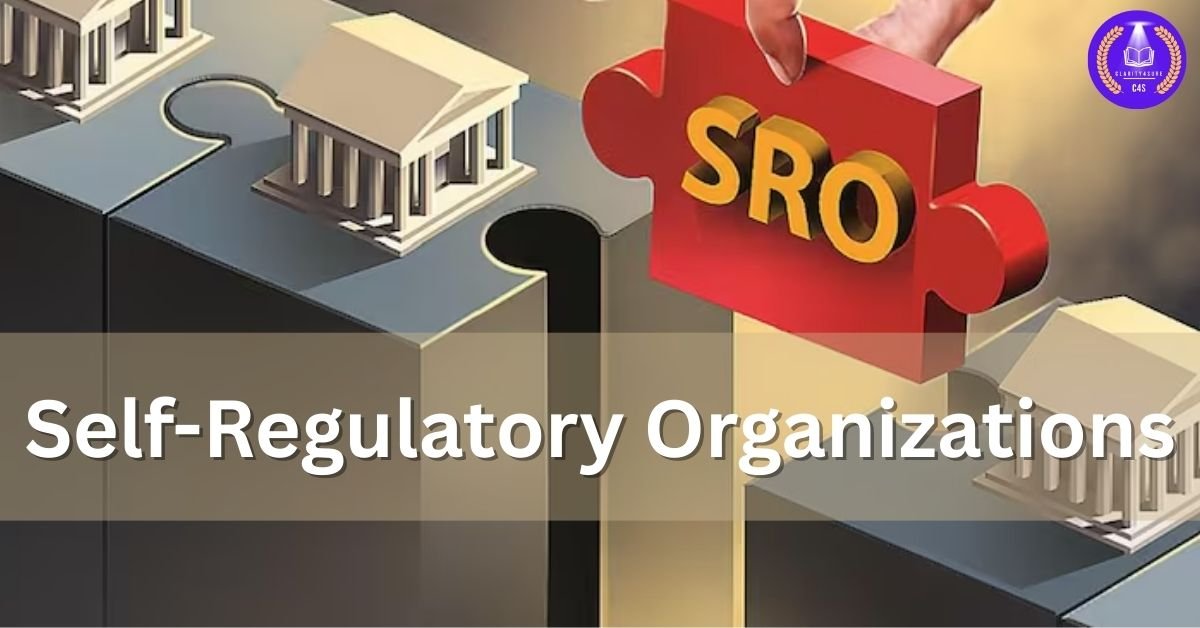Introduction
In modern economies, industries often need oversight to ensure ethical practices, fair competition, and consumer protection. While governments regulate many industries, some sectors rely on Self-Regulatory Organizations (SROs) to establish and enforce standards.
An SRO is a non-governmental organization that regulates its members through rules, policies, and ethical standards. These organizations play a crucial role in maintaining transparency, preventing fraud, and ensuring smooth market operations.
What is a Self-Regulatory Organization ?
A Self-Regulatory Organization (SRO) is an independent body within an industry that sets rules, monitors compliance, and enforces ethical and professional standards without direct government intervention.
Key Features of SROs:
- Non-Governmental –
- Operates independently but may be recognized by government agencies.
- Industry-Specific –
- Focuses on a particular industry like finance, law, healthcare, or advertising.
- Rule Enforcement –
- Establishes and enforces regulations to ensure fair practices.
- Dispute Resolution –
- Mediates conflicts between industry members and consumers.
- Member-Based –
- Governed by industry professionals or associations.
How Do SROs Work?
SROs create a framework of rules for industry participants and enforce compliance through audits, penalties, or license revocations. These organizations function as watchdogs, ensuring that businesses operate ethically and transparently.
Types of Self-Regulatory Organizations (SROs) Worldwide
Self-Regulatory Organizations exist in multiple industries, from finance and securities to healthcare, advertising, and law.
1. Financial & Securities SROs
Financial Industry Regulatory Authority (FINRA) – USA
- Regulates brokerage firms and securities markets.
- Ensures investor protection and fair trading practices.
National Stock Exchange (NSE) & Bombay Stock Exchange (BSE) – India
- Function as SROs for India’s securities market.
- Enforce corporate governance and trading regulations.
Investment Industry Regulatory Organization of Canada (IIROC)
- Regulates investment dealers and financial advisors.
Securities and Exchange Board of India (SEBI) (Partially Self-Regulatory)
- Oversees market integrity but allows self-regulation in some areas.
2. Legal & Professional SROs
American Bar Association (ABA) – USA
- Sets ethical and professional standards for lawyers.
- Provides accreditation for law schools.
The Law Society – UK & Canada
- Regulates solicitors and legal professionals.
- Handles complaints and disciplinary actions.
Chartered Financial Analyst (CFA) Institute
- Ensures ethical behavior among financial analysts.
3. Healthcare & Medical SROs
American Medical Association (AMA)
- Develops ethical guidelines and medical best practices.
- Advocates for patient rights and healthcare policies.
Medical Council of India (MCI) & General Medical Council (GMC) – UK
- Regulate medical education and professional conduct.
Pharmaceutical Research and Manufacturers of America (PhRMA)
- Oversees ethical standards in pharmaceuticals.
4. Advertising & Media SROs
Advertising Standards Authority (ASA) – UK
- Regulates advertising content to ensure fairness and truthfulness.
Press Council of India (PCI)
- Ensures ethical journalism and media accountability.
Motion Picture Association (MPA)
- Oversees movie ratings and industry standards for films.
5. Technology & Digital Industry SROs
As digital markets expand, SROs help regulate online platforms, cybersecurity, and artificial intelligence ethics.
- Examples:
- Internet Corporation for Assigned Names and Numbers (ICANN) –
- Manages domain names and internet policies.
- International Telecommunication Union (ITU) –
- Regulates telecommunication standards.
- Blockchain & Crypto Regulatory Organizations –
- Emerging SROs for digital assets like cryptocurrency.
- Internet Corporation for Assigned Names and Numbers (ICANN) –
Functions and Responsibilities of SROs
Self-Regulatory Organizations play a vital role in industry governance. Their main responsibilities include:
1. Establishing Industry Standards
- SROs develop guidelines for ethical behavior, professional conduct, and quality standards.
2. Licensing & Certification
- Many SROs issue licenses or certifications to qualified professionals (e.g., CFA certification, Bar exams).
3. Monitoring & Compliance
- Conduct regular audits, inspections, and compliance checks to ensure industry standards are met.
4. Consumer & Investor Protection
- Prevent fraud, misinformation, and unethical business practices.
5. Dispute Resolution & Mediation
- Resolve conflicts within the industry through arbitration and disciplinary actions.
6. Market & Professional Ethics Enforcement
- Penalize members who violate regulations, including suspensions, fines, or revocations.
4. Increased Market Stability
- Ensuring ethical conduct helps prevent scandals, fraud, and financial crises.
5. Better Consumer Protection
- SROs uphold industry integrity, ensuring customers and investors are treated fairly.
Advantages of Self-Regulatory Organizations
SROs provide significant benefits for industries, professionals, and consumers.
- Reduced Government Burden –
- Governments cannot oversee every industry in detail, so SROs provide effective sector-specific regulation.
- Faster Dispute Resolution –
- Instead of waiting for court rulings, industry members can resolve conflicts quickly through SRO arbitration.
- Industry Expertise & Specialization –
- SROs are run by industry professionals who have deep knowledge of sector-specific challenges.
- Increased Market Stability –
- Prevents fraud, corruption, and unethical behavior, which strengthens consumer and investor confidence.
- Lower Compliance Costs –
- Regulation through SROs is often more cost-effective than government intervention.
- Encourages Innovation –
- Flexible regulatory frameworks help emerging industries like fintech, blockchain, and artificial intelligence grow without excessive restrictions.
Challenges & Criticism of SROs
Despite their benefits, Self-Regulatory Organizations also face challenges:
- Conflict of Interest –
- Since industry players regulate themselves, there is a risk of bias in decision-making.
- Lack of Legal Authority –
- SROs do not have full enforcement power like government agencies, limiting their ability to impose strict penalties.
- Regulatory Arbitrage –
- Companies may exploit loopholes by registering under less strict SROs.
- Risk of Regulatory Capture –
- Large corporations may influence SRO policies to serve their interests rather than public good.
- Inconsistencies Across Regions –
- Different countries have different regulatory frameworks, making global compliance difficult.
Future of Self-Regulatory Organizations
The role of SROs is evolving with new technologies and globalization. Future trends include:
- Artificial Intelligence & Digital Compliance –
- AI-powered monitoring systems will enhance regulatory effectiveness.
- Global Collaboration & Standardization –
- Cross-border SRO alliances will ensure uniform regulations worldwide.
- Regulation of Emerging Sectors –
- New industries like cryptocurrency, fintech, and artificial intelligence will require self-regulation.
- Greater Transparency & Accountability –
- SROs will adopt open governance models to ensure trust and credibility.
- Public-Private Partnerships –
- Governments may collaborate more with SROs for effective hybrid regulation.
Conclusion
Self-Regulatory Organizations play a critical role in maintaining industry integrity and ethical standards. While they are not a replacement for government regulations, they provide specialized oversight that enhances market stability, professional accountability, and consumer protection.
However, their effectiveness depends on transparency, accountability, and fair enforcement of rules. As industries evolve, SROs must adapt, innovate, and strengthen their regulatory mechanisms to remain effective.




















